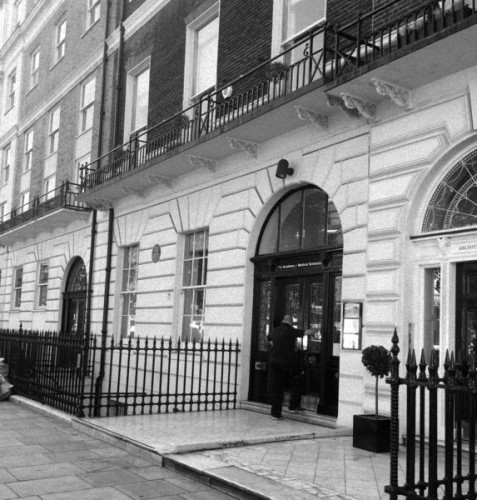
Yesterday I went back to the building that I’d worked in for 15 years. It was for the Gonzalez Byass tasting, which was held at 41 Portland Place, an 18th Century Adam-style terrace that is now home to the Academy of Medical Sciences. I started working there – it was then another scientific charity, the Ciba Foundation – straight from my PhD back in 1992, and I stayed until the charity closed down in 2008. Although it seemed quite tough at the time, being booted into the freelance world was probably the best thing that happened to me. Some choices are too hard to make, especially when you are the sole wage earner and have two young kids.
Going back: it was odd. I walked through reception, and up the same stairs that I’d used countless times. Into the reception room where we’d held all those dinners with our scientist guests, and seeing through the open doors of the dining room where we used to lunch every day. It was a strange experience: everything was so familiar, yet different. The building no longer meant what it once did to me. I didn’t belong there in the same way that I did for so long.
This is what it got me thinking: In the end, all things will end. Nothing is permanent. We can’t stop time. Everything is fresh and new every day. Fortunately, we mostly don’t know when things will end, and I suppose we cope best by living as if everything were forever. But nothing is.
This sounds unduly morose. But I think it is healthier to integrate future loss – and the fear of endings – into the present. Death is part of life. Parting will follow meeting. It’s impossible to separate out the thread of sadness this knowledge brings from the many threads of joy that the present is full of. Rather than deny this sadness – the realization that endings follow beginnings, and that all will pass – we need to savour the whole experience of life. It’s super-healthy to be able to see not only from our own perspective, but also to take a step sideways to see with fresh eyes. We are not at the centre of the world, but are merely playing a part in something bigger than we are. Much as with Galileo’s realization that the sun doesn’t orbit the earth, the notion that we are not the centre of everything doesn’t go down too well with some. But it’s the way it is.
In the end, all things will end. But knowing this shouldn’t stop us starting things, and it shouldn’t be used to put off new beginnings.
I’m not sure I can relate this to wine, but I will try. Nothing stands still. A wine cannot be locked in time. A vineyard changes every season. Wine keeps moving. Even a bottle in a collector’s seller has a life and journey of its own. Wine parallels life in the way that it changes and transitions, and with the variations of seasons, variety, how it is made and how it is cellared. One of the richest aspects of wine is its incredible variation, and also the way it keeps changing. Let’s hope that attempts to make it more consistent and marketable don’t kill this richness.
2 Comments on On going back, and beginnings and endings


Jamie ecrit
‘the notion that we are not the centre of everything doesn’t go down too well with some. But it’s the way it is.’
How can you know this Scientifically?
When i die i cannot know whether the whole construct doesn’t cease to exist also.
It is equally as likely that each of us is the center of a self-made universe as it is that it exists independently of us.
I think the best way to relate this to wine is that the realisation of our own mortality should encourage us to open those precious bottles which we can sometimes be over-zealous in keeping for “the right moment’.
The ‘right moment’ – as many more enlightened wine drinkers will readily admit – is the moment that the bottle itself is opened, and not some imagined perfect moment in the future.
So get some friends around, crack open that hallowed wine in your cellar and toast to life – for you never know, you might not be around tomorrow to enjoy it then…